By David Shepardson
WASHINGTON (Reuters) - U.S. President Donald Trump on Wednesday signed an executive order directing U.S. agencies to test the vulnerabilities of critical infrastructure systems in the event of a disruption or manipulation of satellite-based global positioning system services (GPS).
GPS is key to the functioning of electrical power grids, weather forecasting, traffic signals, smartphone applications, financial services and vehicle navigation, among a host of other systems.
The order, directing federal agencies to develop a plan to test infrastructure systems within one year, said "disruption or manipulation of these services has the potential to adversely affect the national and economic security of the United States."
Congress has raised concerns about GPS systems and satellite communications in the past. A group of U.S. lawmakers wrote the Trump administration in May 2019 saying GPS signals were "exceptionally weak and easily disrupted."
The U.S. government has been working since 2004 to acquire a terrestrial backup system for GPS and in recent years Congress required the Trump administration to implement a demonstration program.
The U.S. Transportation Department plans to recommend a backup GPS system or systems by the end of the year, officials said. Testing of 11 technologies in Massachusetts and Virginia will be completed by May.
The Commerce Department’s National Institute of Standards and Technology (NIST) has estimated in one study that "a hypothetical disruption to GPS could result in $30 billion to $45 billion in economic losses over a 30-day period."
Under Trump's order, the Commerce Department is making its independent source of precision time available within 180 days to both the public and private sector to assist critical infrastructure owners and operators.

The service offers a reliable source of time independent from GPS. The newer time source, available through a commercial fiber optic cable, will use commercial telecommunication networks and be more accurate than the current internet-time service by a factor of 1,000, the Commerce Department said.